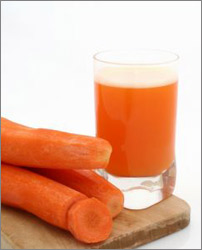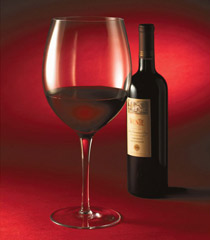 Vampire Weekend's Surprising Jewish Stories
Vampire Weekend's Surprising Jewish Stories


4 min read
Juice is considered a separate entity from the fruit.
In the previous class we learned about how altering the state of a food can affect a change in its bracha. Today's lesson will discuss the bracha for fruit juices and wine.
As a rule, the bracha on fruit juices is Shehakol. The reason why you don't say Ha'aitz on fruit juices is because the juice is considered a separate entity from the fruit, and can therefore not be referred to as "pri ha'aitz." So, the bracha for orange, apple and peach juice (to name a few) is Shehakol.1
 The same rule applies to "vegetable juice" – e.g. carrot juice, tomato juice, and – since they are halachically "vegetables" – strawberry and banana juice, too.
The same rule applies to "vegetable juice" – e.g. carrot juice, tomato juice, and – since they are halachically "vegetables" – strawberry and banana juice, too.
What if you had some apple juice and mistakenly said Ha'aitz – although that was a mistake, perhaps post facto the bracha is valid?
The answer is: It depends. If the juice is made out of the entire fruit (e.g. tomato juice, pear nectar) or made by cooking the fruit (e.g. prune juice), although the proper bracha is Shehakol, in these cases if you said Ha'aitz, the bracha is valid.2
Now let's talk about an exception to the rule. Although the juice of most fruits receives a Shehakol, two exceptions are grapes and olives. Most people don't go around drinking olive oil,3 so we'll limit our discussion today to the "juice of grapes" – i.e. wine and grape juice.
Unlike other fruit juices, wine and grape juice are allotted their own unique bracha: "borei pri ha'gafen." The reason for wine's elevated status is that it both satiates the appetite and gladdens the heart, as it says in Psalms 104:16.4 As such, it is the most important of all beverages, and is used for Jewish rituals like Kiddush.
 Although grape juice does not share the unique properties of wine, it nevertheless receives the bracha Ha'gafen. The reason is that all juice extracted from grapes has the potential to become wine, so Ha'gafen is the appropriate bracha, regardless of whether or not it actually becomes wine.5
Although grape juice does not share the unique properties of wine, it nevertheless receives the bracha Ha'gafen. The reason is that all juice extracted from grapes has the potential to become wine, so Ha'gafen is the appropriate bracha, regardless of whether or not it actually becomes wine.5
A beverage that intoxicates but is not made from grapes (beer, whiskey, cherry wine) does not receive a Ha'gafen. The bracha on these drinks is Shehakol.6
Even on drinks made from distilled wine (e.g. brandy, cognac), the custom is to say Shehakol,7 due to the distilling process.
Wine that is watered down retains the bracha Ha'gafen -- as long as it can be served as "wine." If, however, you dilute wine to the point where it would no longer be served as wine, its bracha becomes Shehakol.8
When diluted, grape juice easily loses its distinctive taste. Therefore, when diluting grape juice with any significant9 amount of water you can no longer say Ha'gafen.10
In practice, since it can be difficult to determine whether or not the taste of wine or grape juice has been significantly diminished when diluted, it is recommended that you say Ha'gafen on non-diluted wine or grape juice before drinking the diluted beverage.11
This concludes class #7 on Hilchot Brachot. In the next lesson, we'll learn about special rules that pertain to the bracha Ha'gafen.
